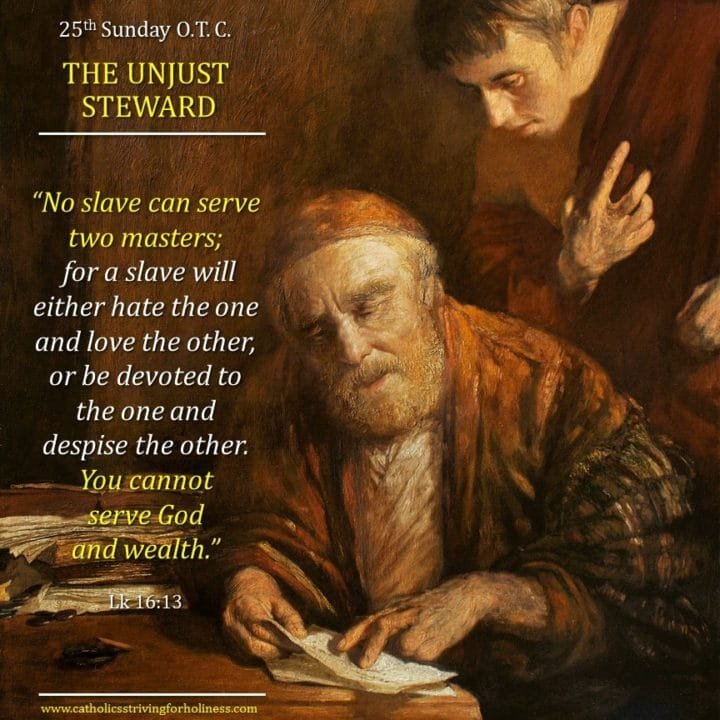Homily for the 25th Sunday in Ordinary Time Year C
The UNJUST STEWARD.
“You cannot serve both God and wealth.”
The UNJUST STEWARD.
“You cannot serve both God and wealth.”

1. In the 1st reading (Amos 8:4-7), the prophet denounces the corruption during his time. The disordered love for riches leads to grave injustices and the victims are as always the poor. And God will never forget their deeds.
Secondly, the fact that the master “praised” the shrewd and astute behavior and effort of his servant’s immoral attitude of reducing the debts of the others to his master because he wishes to have “friends” who would help him during his hard times, is not an approval of the servant’s immoral behavior itself.
- Rather, his master praised his steward’s zeal and determination to provide for his future security. It is thus an encouragement for us to put the same zeal, ingenuity and effort in our worldly affairs into the affairs of our soul, our relationship with God, our holiness and our salvation and that of others as well.
- We need to employ all legitimate resources with heroic effort and sacrifice, counting on God’s grace, when it comes to matters of saving our soul and spreading the Kingdom of God.
- Usain Bolt won the gold medal in the 100-meter race by just 0:08 seconds. Severe infection and possible death will ensue if a pneumonia, caused by a very small bacterium, is not treated with the proper antibiotics. Water leakages, if not remedied, would eventually lead to a high-water consumption bill, if not a flooded bathroom or house! A small deviation in the angle of ship’s or plane’s trajectory, if not corrected, will bring it to a destination different from that intended….and so on.
- In the same manner, virtues, holiness, salvation consist in the small details of our daily life carried out for love of God and others.
- Wealth, possessions, material things, though necessary in our life, are insignificant compared to spiritual wealth such that temporal riches should not occupy the place which belongs only to God.
- Rather, we must learn and struggle to live for God, love and serve Him, not only allocating some time for Him but rather in everything that we do.
- All human realities such as work, sustenance of oneself or one’s family, temporal goods and possessions must be directed to the service of God, −and through and for love of Him−, to the service of others.
CLICK ON THE LINK BELOW
https://catholicsstrivingforholiness.org/25th-sunday-of-ordinary-time-mass-prayers-and-readings-year-c/
A Blessed Sunday and week ahead to all! God bless!
Fr. Rolly Arjonillo, priest of Opus Dei.
Stay updated: subscribe by email for free TO OUR NEW WEBSITE www.catholicsstrivingforholiness.org (PUT YOUR EMAIL IN THE SUBSCRIBE WIDGET).
We are also in www.fb.com/Catholicsstrivingforholiness. Kindly help more people in their Christian life by liking our page and inviting your family, friends and relatives to do so as well. Thanks in advance and God bless you and your loved ones! Fr. Rolly Arjonillo

